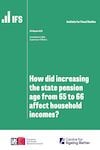Sign up to receive the latest news, research, policy updates and events about ageing.
SubscribeContact our team for more information
Contact usWith rising life expectancy and an ageing population, there are pressures on the financial sustainability of providing state pensions in the UK: the number of people of pensionable age is projected to reach over 15.2 million by 2045, a 28% increase on the level in 2020.
Not only is this analysis important for evaluating this previous increase in the state pension age, but it's also useful for assessing the potential effects of future increases.
Key findings include:

Sign up to receive the latest news, research, policy updates and events about ageing.
SubscribeContact our team for more information
Contact us